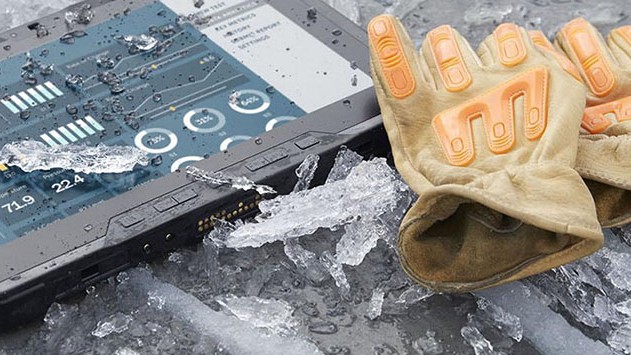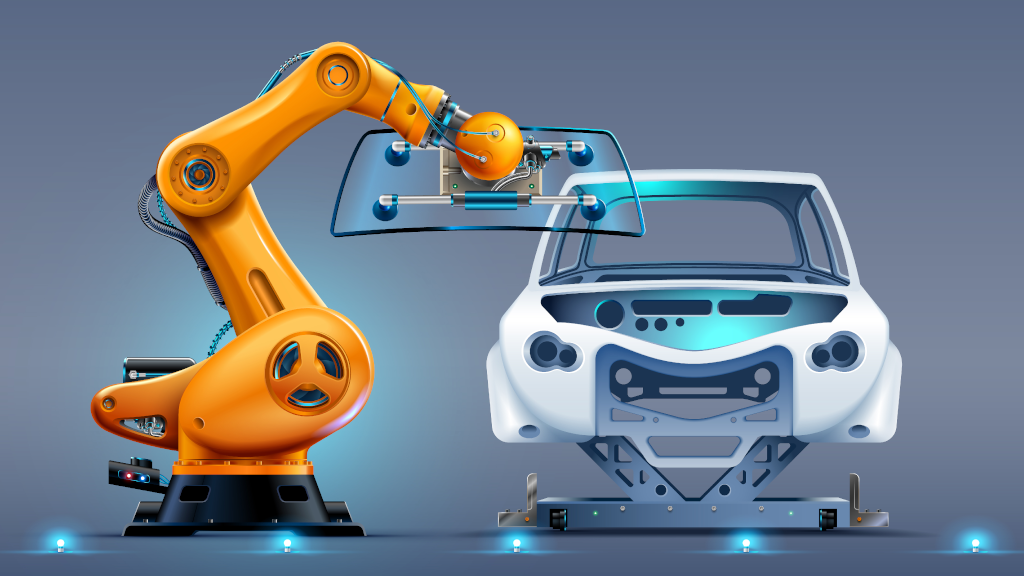Industrial tablets are becoming increasingly popular in the manufacturing sector. Taking a more pragmatic approach than consumer-focused enterprises, manufacturing environments choose to deploy military grade tablets due to their reliability, durability and total cost of ownership.
The rugged design, advanced hardware additions such as hot-swappable batteries, integrated RFID, barcode or card readers, full compatibility with productivity applications, serial ports, advanced security, authentication and connectivity options and many other features make an industrial tablet one of the most favored devices on the manufacturing floor.
The rewards of deploying industrial tablets in manufacturing are generous. Efficient capturing, processing and using data in the workplace allows enterprises streamline the workflow, increase the workforce efficiency, and ensure accurate and timely data sharing. Eliminating the cumbersome and inefficient paper trails, industrial tablets take the productivity of the manufacturing mobile workforce to the new heights.
Cost Benefits
Article Guide
While consumer devices and BYOD (bring your own device) are common business enablers, the manufacturing sector is increasingly turning to rugged, military grade tablets as the companies realize the cost benefits. With consumer tablets, the initial purchase price makes only 20-35% of the TCO (total cost of ownership) of the device. Maintenance, fail rates, security issues, and downtime due to the insufficient ruggedness of consumer devices add up a significant amount to the TCO of consumer devices. According to Venture Development Corporation (VDC), the TCO of a rugged, military grade tablet is 59% lower than that of the non-rugged alternative. Over the course of five years, the average TCO of a consumer tablet amounts to $34K versus the TCO of an industrial tablet of $14K.
Uptime Benefits
The same VDC research found the lost productivity to be the leading contributor to the TCO of the non-rugged tablets, representing 37% of a consumer mobile device’s TCO. On average, employees lose 52-80 minutes of productivity due to mobile device failure.
Average failure rates for consumer tablets, when used in manufacturing, vary with different industry sources, but VDC quotes 12.9%. Compare to Cybernet’s industrial tablets, which haven’t exceeded the 1.9% failure rate over the last few years.
The manufacturing environment is demanding, so equipment must be sturdy, durable and reliable to withstand shock, vibration, dirty and dusty conditions, liquid spills and other conditions hazardous to electronic devices. Bumps, drops, and knocks, extremes of environmental temperature – a military-grade tablet used in manufacturing must perform flawlessly under these conditions. Industrial tablets’ IP ratings and extensive testing and certifications provide the necessary reliability and durability.
Productivity Applications Compatibility
Industrial tablets are predominantly Windows or Linux-based due to the compatibility requirements of the manufacturing sector. Mobile workers need to be able to use the enterprise software they normally use on desktop computers, and no operating system but Windows provides the full compatibility with most of them.
Ease of use, the familiarity of the UI, and enterprise productivity software make the usage of industrial tablets easy to use for the end user and facilitates deployment and maintenance for the IT personnel. Windows operating system enables preexisting desktop or HMI and fixed terminals applications to migrate to mobile with minimum adjustments and re-development. The ability to maintain maximum compatibility with the manufacturing back-end system is critical for timely and secure data sync, as well as for worker productivity.
Security Benefits
Military grade tablets simplify security through advanced authentication options such as biometric readers, CAC, and smart card readers, and RFID scanners. Advanced authentication enables sophisticated user account management and data access clearance. Paired with data encryption and secure data transmission, industrial tablets provide superior data security features.
Uptime Due to Extended Battery Life Benefits
For the manufacturing sector, battery life can be one of the deal breakers. Industrial tablets provide virtually unlimited battery life with hot-swappable batteries and multi-battery charging stations, and long-life power cells. Preventing downtime due to power interruptions is crucial in manufacturing and in the field.
Docking, Mounting and Compatibility With Legacy Equipment Benefits
Integrated legacy ports, docking, and mounting connectors enable industrial tablets to be mounted onto a forklift and picking carts, walls, and in the vehicles, as well as connect to legacy equipment. Some industrial tablets come with a carrying handle.
Advanced docking and mounting options and a carrying handle allow employees to move around the facility and multitask with ease. Since space on the manufacturing floor is often limited, a lightweight industrial tablet easily docked on a cart, in a forklift cab, or on the side of the industrial equipment significantly increases the ease of use, visualization, and productivity. Most importantly, the mounting options free the hands of the operator for the handling of the manufacturing processes.
Rugged Benefits
Military grade tablets take longer to design, test, certify and finally release. Production cycles for industrial tablets are significantly longer than those for the consumer devices. The latter are released nearly every six months, and quickly become obsolete. The replacement costs due to obsolescence coupled with the costs of replacing tablets damaged by severe environments are significant.
The sturdy casing of industrial tablets, their ingress and drop protection, military grade components, and capability to withstand extreme temperatures, humidity, vibration, shock, drop, liquid impact and dust can not be surpassed by any consumer alternative.
Consumer Repackaging Is Just Not Good Enough
Consumer tablets are not apt for the task on the manufacturing floor or in the field for many reasons, irrespective of the rugged look they may acquire after repackaging. The issues with consumer tablets in manufacturing are many:
- they are not actually rugged since drop and basic impact protection is not enough for a manufacturing environment;
- iOS and Android do not provide the feature set and compatibility of Windows necessary for manufacturing productivity suites;
- they do not integrate well into the existing ecosystem, are not compatible with legacy equipment;
- when used in manufacturing, they have a high failure rate, short life cycles and become obsolete fast, as manufacturers release new models every six months and eventually drop support for older models;
- they lack water resistance and readability in the sunlit environments;
- poor security that even a closed network can not remedy;
- they don’t offer the integrated RFID, barcode, CAC or smart card readers.
Industrial tablets are customizable at the OS, hardware and software levels, which translates to stellar performance, mobility, security and high ROI.
Why Choose Rugged Tablets over Consumer Tablets
January 12, 2016
As technology continues to play a more integral in the way companies operate, many are now opting to use mobile tablet computers for their business purposes. In fact, According to Quarterly Mobile PC Shipment and…
0 Comments4 Minutes
The Use of Industrial Computers in the Aerospace Sector
September 17, 2015
Over recent years, industrial computers have come to take on a critical role in a number of professions. The aerospace industry is one sector that has come to rely on the use of these devices to address a number of…
0 Comments4 Minutes
The Use of Industrial Computers in the Automotive Industry
August 20, 2019
The automotive industry invented automation: it’s no surprise that they’ve embraced industrial computers faster than any other field of manufacturing. Because automotive manufacturing requires flexible solutions that…
0 Comments7 Minutes
You Can't
Learn from a Pop-up
But we can deliver knowledge to your inbox!
We dive deep in the industry looking for new trends, technology, news, and updates. We're happy to share them with you.
Knowledge, News, and Industry Updates Right in Your Inbox





